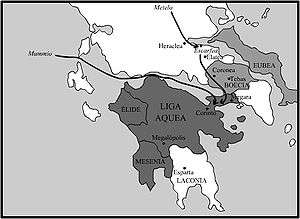Achaean War
The Achaean War was an uprising by the Greek Achaean League, an alliance of Achaean and other Peloponnesian states in ancient Greece, against the Roman Republic around 146 BC, just after the Fourth Macedonian War. Rome defeated the League swiftly, and as a lesson, they destroyed the ancient city of Corinth. The war ended with Greece's independence taken away, and Greece became the Roman provinces of Achaea and Epirus.
| Achaean War | |||||||||
|---|---|---|---|---|---|---|---|---|---|
Scene of the Battle of Corinth (146 BC): last day before the Roman legions looted and burned the Greek city of Corinth. The last day on Corinth, Tony Robert-Fleury, 1870 | |||||||||
| |||||||||
| Belligerents | |||||||||
|
| Achaean League | ||||||||
| Commanders and leaders | |||||||||
|
| Diaeus | ||||||||

Background
The Roman Republic had developed close ties to the Achaean League through similar religious and military beliefs and a cooperation in the previous Macedonian Wars. But despite co-operation in the latter part of the third century and early second century, political problems in Achaea soon came to a head. Two factions began to emerge - one, championed by the Achaean statesmen Philopoemen and Lycortas, which called for Achaea to determine its own foreign policy according to its own law, and one, championed by figures like Aristaenus and Diophanes, who believed in yielding to Rome on all matters of foreign policy.[1]
Achaea was, in addition, undergoing internal pressures beyond the question over the nature of the influence of Rome. The withdrawal of Messene from the Achaean League[2] and further disputes with Sparta over the nature of its position in the League led to growing amounts of micromanagement by the Romans, including the sending in 184 of a Roman, Appius Claudius, to judge the case between Sparta and Achaea.[3][4]
The taking of thousands of hostages by Rome in order to guarantee the compliance of Achaea during the Third Macedonian War, which involved the deportation of the historian Polybius to Rome, was the source of much diplomatic quarrel between Achaea and Rome, and it is arguable that this contributed in large part to the souring of relations between the two powers. No less than five embassies were sent by Achaea to Rome seeking the return of the hostages[5] and Roman intransigence demonstrates the power difference between the two. This diplomatic stand-off was the beginning of the events leading to the Achaean War.
Achaean domestic politics at the time played a large part in the coming about of the war. Upon the election of the populist[6] generals Critolaus and Diaeus, economic proposals were made which would relieve the debt burden of the poor, free native-born and native-bred slaves, and increase taxes on the rich, all of which, according to Polybius, had the desired effect of increasing support for a nationalistic dispute with Rome amongst the lower classes of Achaea. An uprising around this time by the pretender Andriscus in the Fourth Macedonian War may also have spread to Achaea, giving hope that Rome, engaged in the Third Punic War to the West, would be too busy to deal with Greek rebellions against Roman rule.
Roman foreign policy in the Greek east in the period following the Third Macedonian War had also become increasingly in favour of micromanagement and the forced breaking-up of large entities, seen by the regionalisation of Macedon by the general Lucius Mummius Achaicus and the Senate's mission to the magistrate Gallus, upon the application of the town Pleuron to leave the Achaean League, to sever as many cities from it as possible.[7] In 146, things reached a head when the former consul Lucius Aurelius Orestes was sent to Corinth to announce the forced reduction of the Achaean League to its original, narrow grouping - effectively crippling it and ending its territorial ambitions once and for all. A misguided effort at restoring peace, led by Orestes' former co-consul Sextus Julius Caesar, went badly, and the Achaeans, outraged at Rome's actions, and whipping up populist sentiment, declared war on Rome.
War
The Achaeans were aware that they were entering a suicidal war of defiance, as Rome had just soundly conquered Macedon, a much more powerful kingdom. The Romans won at Scarpheia, then conclusively defeated them at the Battle of Corinth (146 BC). The Achaean league was then disbanded, Corinth and Patras were destroyed as punishment, and virtually all of mainland Greece was annexed by Rome.
References
- P.S. Derow, ‘Rome, the Fall of Macedon and the Sack of Corinth’ in Cambridge Ancient History vol. 8, 290-323
- Polybius 23
- Livy 39.37
- Polybius 23.17
- E. Gruen, ‘The Origins of the Achaean War’, JHS 96 (1976): 46-69
- Polybius 38
- Pausanias 7.11
- Wilson, N. G. Encyclopedia of Ancient Greece. New York: Routledge, 2006. Print. Google Books.
- "Achaean League" A Dictionary of World History. Oxford University Press, 2000. Oxford Reference Online. Oxford University Press. York University. 25 October 2011